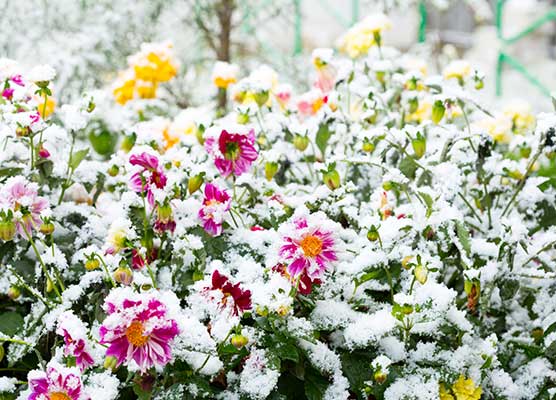
Does it Snow During the Spring in Colorado?
Yes it does! For those who are not natives or familiar with a Colorado’s seasonal weather, Spring often has some of our heavier months of snowfall.
Although it can make an already long winter seem inescapable, spring snow is very different when it falls this time of year versus in the dead of winter.
Let’s take a look at those differences and how we prepare for the snow in the spring season.
The Science Behind Spring Snow
What’s the Sun Got to Do with It?
In the winter, the sun’s low angle often leads to the snow sticking around for days, or as this season proved, weeks.
However as the spring season comes around, the higher angle of the sun and greater overall strength helps to keep surfaces warmer. Both factors helping with more efficient snow melting through spring.
The Moisture Matters!
Winter’s colder temperatures usually produce very light, airy and fluffy snow. There is far less moisture in each snowflake because of this.
In contrast the spring season’s mild temperatures make for heavier and wetter snow. We’ve seen some of our biggest snowstorms in the spring season because of the heavier snow quality.
So How Much Spring Snow Does Colorado ‘Actually’ Get?
March is typically the snowiest month of the year/snow season for Colorado. An average of 11.3 inches falls in this transition month. April ranks second, often accumulating 8.8 inches of the heavy wet stuff on average. With the added moisture in the snow it can create more potent storms during spring time.
How Snowology Adjusts for Spring Storms
With the warmer pavement temperatures, parking and sidewalk surfaces don’t require the same amount of deicer. Reducing the application rates will help reduce costs and impacts on the environment, all while still achieving the number one goal…safety. Speaking of deicing, spring time is also NOT a good time for pre-treating, especially with liquids.
What is Pre-Treating for Snow Storms?
Pre-treating is the process of putting down anti-icing chemicals to help prevent snow and ice from forming a bond with the concrete or asphalt. This practice can be especially helpful on elevated surfaces such as garage tops and for low tolerance sites. However, with spring storms carrying so much moisture, applying a liquid anti-icer before a storm can prove to be a moot point as the chemicals may get washed away.
Generally speaking, if you must pre-treat, we recommend using a granular deicer such as Ice Slicer.
Managing Heavier Spring Snow
That heavy wet snow can also wreak havoc on your garage deck. Garage decks are engineered to support a certain amount of weight and when you plow snow and pile it in certain locations, those weight limits can be pushed to the extreme. New snow with normal moisture content can weigh 4-5lbs per cubic foot, however, wet snow pushed into a snow pile can weigh as much as 20-30lbs per cubic foot.
When you have these snow loads it is imperative that you understand your structures abilities and remove the snow as soon as possible if need be. Using a qualified contractor like Snowology is also important as garage decks typically have special coatings and require the use of special equipment such as poly blades and highly trained operators to remove the snow without causing damages that can be in the thousands.
What You Need to Know to Prepare for Spring Snow
Reminder: Shoveling Snow
Always be careful when shoveling in the spring.
The wet, heavy snow can be dangerous to shovel and can cause neck and back injuries or even heart attacks for those not in the shape in which to move this heavy wet snow.
Protecting Your Landscape
Spring snow can be incredibly damaging. The heavy weight on trees and power lines can cause them to fall, break and snap. Power outages are a common occurrence during spring storms – always have an emergency kit at arm’s length for these weather conditions.
Flowers, plants and shrubbery can also be harmed, or even die, in excessive conditions. Always cover or bring inside those sensitive plants when forecasting calls for a heavy snowfall or freeze. If you find yourself needing post storm landscape services, make sure to visit us at www.oneproservices.net.
Let’s be honest, it really doesn’t matter if it is the dead of winter, light, airy fluffy snow… OR… wet, sloppy heavy spring snow. Colorado gets its fair share of both.
With that being said, make sure you are prepared, but more importantly, make sure your commercial property is prepared. And by prepared, we don’t mean do it yourself, call Snowology or send a form for custom pricing!
Spring snow can be a hassle, but don’t let it be one to your commercial property!
